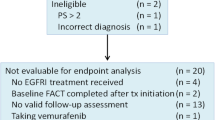Abstract
Purpose
The functional assessment of cancer therapy epidermal growth factor receptor inhibitor 18 (FACT-EGFRI-18) is a patient-reported outcomes questionnaire developed to assess the effect of EGFRI on health-related quality of life (HRQoL).
Methods
Ten native-speaking residents of The Netherlands who reported EGFRI-associated mucocutaneous adverse events (mcAEs) were administered the questionnaire. Patients were subsequently asked a standardized series of questions about the items’ personal relevance.
Results
Responses reflected a major negative impact of mcAEs due to EGFRI on physical, social/emotional, and functional domains. In some cases, especially in the social/emotional domain, the responses to the qualitative interview indicated a greater impact on HRQoL than the numerical ratings previously selected for the Dutch FACT-EGFRI-18 questions.
Conclusions
Based on these interviews, we identified that the physical items associated with mcAEs interfere most with HRQoL. The results suggest that the FACT-EGFRI-18 can be applied to measure mcAE-related HRQoL in cancer patients undergoing EGFRI therapy. In addition, patients feel the need to rate their symptom burden, too, and we recommend additional adverse event items to be incorporated into the questionnaire.
Similar content being viewed by others
References
Balagula Y, Garbe C, Myskowski PL, Hauschild A, Rapoport BL, Boers-Doets CB, Lacouture ME (2011) Clinical presentation and management of dermatological toxicities of epidermal growth factor receptor inhibitors. Int J Dermatol 50(2):129–146
Iacovelli L (2007) Clinical management of EGFRI-associated dermatologic toxicities: pharmacy perspective. Oncology (Williston Park) 21(11 Suppl 5):31–33
Lacouture ME, Melosky BL (2007) Cutaneous reactions to anticancer agents targeting the epidermal growth factor receptor: a dermatology-oncology perspective. Skin Therapy Lett 12(6):1–5
Perez-Soler R, van Cutsem E (2007) Clinical research of EGFR inhibitors and related dermatologic toxicities. Oncology (Williston Park) 21(11 Suppl 5):10–16
Hu JC, Sadeghi P, Pinter-Brown LC, Yashar S, Chiu MW (2007) Cutaneous side effects of epidermal growth factor receptor inhibitors: clinical presentation, pathogenesis, and management. J Am Acad Dermatol 56(2):317–326
Wagner LI, Lacouture ME (2007) Dermatologic toxicities associated with EGFR inhibitors: the clinical psychologist's perspective. Impact on health-related quality of life and implications for clinical management of psychological sequelae. Oncology (Williston Park) 21(11 Suppl 5):34–36
Cleeland CS (2007) Symptom burden: multiple symptoms and their impact as patient-reported outcomes. J Natl Cancer Inst Monogr 37:16–21
Fayers PM, Hand DJ, Bjordal K, Groenvold M (1997) Causal indicators in quality of life research. Qual Life Res 6(5):393–406
Wilson IB, Cleary PD (1995) Linking clinical variables with health-related quality of life. A conceptual model of patient outcomes. JAMA 273(1):59–65
Ferrans CE, Zerwic JJ, Wilbur JE, Larson JL (2005) Conceptual model of health-related quality of life. J Nurs Scholarsh 37(4):336–342
Joshi SS, Ortiz S, Witherspoon JN, Rademaker A, West DP, Anderson R, Rosenbaum SE, Lacouture ME (2010) Effects of epidermal growth factor receptor inhibitor-induced dermatologic toxicities on quality of life. Cancer 116(16):3916–3923
Cella DF (1994) Quality of life: concepts and definition. J Pain Symptom Manag 9(3):186–192
Ratanatharathorn V, Sirilerttrakul S, Jirajarus M, Silpakit C, Maneechavakajorn J, Sailamai P, Sirisinha T (2001) Quality of life, functional assessment of cancer therapy-general. J Med Assoc Thail 84(10):1430–1442
Wagner LI, Lai SE, Aneja M, LoRusso P, Perez-Soler R, O'Brien B et al (2007) Development of a functional assessment of side-effects to therapy (FAST) questionnaire to assess dermatology-related quality of life in patients treated with EGFR inhibitors (EGFRI): the FAST-EGFRI. J Clin Oncol ASCO Meet Abstr 25(18 Suppl):19532
U.S. Food and Drug Administration (2009) Guidance for industry: patient-reported outcomes measure: use in medical product development to support labeling claims. http://www.fda.gov/downloads/Drugs/GuidanceComplianceRegulatoryInformation/Guidances/UCM193282.pdf
Willke RJ, Burke LB, Erickson P (2004) Measuring treatment impact: a review of patient-reported outcomes and other efficacy endpoints in approved product labels. Control Clin Trials 25(6):535–552
Calvert MJ, Freemantle N (2003) Use of health-related quality of life in prescribing research. Part 1: why evaluate health-related quality of life? J Clin Pharm Ther 28(6):513–521
Calvert MJ, Freemantle N (2004) Use of health-related quality of life in prescribing research. Part 2: methodological considerations for the assessment of health-related quality of life in clinical trials. J Clin Pharm Ther 29(1):85–94
National Cancer Institute Cancer Therapy Evaluation Program (2010) Common terminology criteria for adverse events and common toxicity criteria [v4.0]. http://ctep.cancer.gov/protocolDevelopment/electronic_applications/ctc.htm#ctc_v40
Wagner LI, Rosenbaum SE, Gandhi M, Webster K, Aneja MS, Cella D et al (2010) Development of a functional assessment of chronic illness therapy questionnaire to assess dermatology-related quality of life in patients treated with EGFR inhibitors: FACT-EGFRI. J Clin Oncol 28 [15s], (suppl; abstr 9046)
FACIT.org (2010) Functional Assessment of Chronic Illness Therapy (FACIT). http://www.facit.org/FACITOrg/Questionnaires
Webster K, Cella D, Yost K (2003) The Functional Assessment of Chronic Illness Therapy (FACIT) measurement system: properties, applications, and interpretation. Health Qual Life Outcomes 1:79–84
Bonomi AE, Cella DF, Hahn EA, Bjordal K, Sperner-Unterweger B, Gangeri L, Bergman B, Willems-Groot J, Hanquet P, Zittoun R (1996) Multilingual translation of the Functional Assessment of Cancer Therapy (FACT) quality of life measurement system. Qual Life Res 5(3):309–320
Eremenco SL, Cella D, Arnold BJ (2005) A comprehensive method for the translation and cross-cultural validation of health status questionnaires. Eval Health Prof 28(2):212–232
Cella D, Webster K (1997) Linking outcomes management to quality-of-life measurement. Oncology (Williston Park) 11(11A):232–235
Acknowledgments
The authors thank the participants for their collaboration in this study and their valuable contributions.
Conflict of interest
The authors declare no conflicts of interest. All authors had full control of all primary data and agree to allow the journal to review the data, if requested.
Author information
Authors and Affiliations
Corresponding author
Rights and permissions
About this article
Cite this article
Boers-Doets, C.B., Gelderblom, H., Lacouture, M.E. et al. Experiences with the FACT-EGFRI-18 instrument in EGFRI-associated mucocutaneous adverse events. Support Care Cancer 21, 1919–1926 (2013). https://doi.org/10.1007/s00520-013-1752-4
Received:
Accepted:
Published:
Issue Date:
DOI: https://doi.org/10.1007/s00520-013-1752-4




